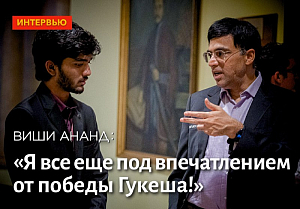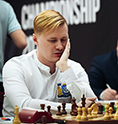Pavel Ponkratov: I fight simply because I fight!
The winner of the Russian Rapid Grand Prix final answers Dmitry Kryakvin’s questions
- Pavel, my congratulations! How was the tournament going on for you, which games were decisive?
- Thank you! The tournament turned out to be hard and nervous. It seems to me that all the finalists were playing below their potential. Each of them had one’s own reasons, but the scrap level happened to be incredibly high. On the other hand, the spectators, who were watching the event closely, had no reason to be bored.
My “roller coaster” did not do without a considerable share of luck, for example, in my games versus Pridorozhni, Yudin, and Khanin. The key encounters, except for the last two decisive games, were the ones with Pridorozhni, where, in case of a loss, I would have fallen down to the bottom of the crosstable, and with Bocharov, where it was decided whether I would fight for the medals or go down to the depth of the peloton.
- Do you often have to play decisive games in the Russian open tournaments, where the last round determines whether you go home with a prize or light-handed?
- There is a decisive game in every tournament, and it is good when it is played in the final rounds – it means that you are fighting for the highest places and performing successfully. I have played a lot of decisive games in penultimate and last rounds this season, but with varied success.
- Do you dispose yourself somehow on a key fight?
- Firstly, I try to calculate mathematically how I should play: in a sharp manner to win or carefully. My next step is to switch off emotions and act in a “Do what you must, come what may” mode. But the last rounds are usually played in the morning and it is often quite hard to stay calm — one doesn’t manage to sleep one’s fill and accumulate enough power for it.
- What is your opinion about the format of the Russian Cup qualification events and the final tournament?
- The format is splendid! The final is 3 days of intense chess battles, a round-robin event where each participant meets all other contestants. Of course, Dame Fortune has a lot of aces up her sleeve in this format, but still the role of chance is not so significant. Furthermore, young chess players and a girl, who have qualified for the final, get a possibility to play about ten games with grandmasters, and it is a great experience!
But there is a hefty dose of egoism in my words: the alternative is a knock-out tournament, and I feel a “special love” towards it due to my “outstanding” statistics.
There is a fly in the ointment as well: two invited players are too much taking into consideration a limited number of qualifying spots. This year (the interview was taken in 2017 – ed.) a stage in the Altai Republic could seriously strike at qualification process (the tournament is fine, the issue is in its status of a stage of the Russian Rapid Grand Prix). Let me remind you a situation, which took place several years ago: Dreev won 3 stages and still had a risk not to be qualified for the final. One place should be left for the Organizer’s nominee, but it would be more just to bring back the second place to the qualifying competition.
- Which qualities distinguish a strong rapid player? Your rapid rating is much higher than a standard one.
- One can joke and say that people, whose results in rapid are higher than in classical chess, are just too lazy to occupy themselves with a deep opening preparation. And it would be a fib after all. Although the role of the opening is indeed declining, the value of a general level of play or a deep understanding (understanding, in particular!) of positions with a limited opening repertoire is increasing; the importance of a calculating speed is dramatically rising as well. It is necessary to calculate lines quickly and evaluate their consequences precisely. Of course, it is important in classical games, but there the role of a deep, precise, “mathematical” preparation is much higher.
- They often hold you as an example of an uncompromising fighter. Why do short draws happen so seldom in Pavel Ponkratov’s career?
- There are many reasons worth mentioning. For example, there is an upbringing, chess childhood, in which “the winner took it all”, a typical situation for the majority of open tournaments when the first place costs five fifth places. When needlessly bailing out with White, a player is consciously treating oneself with disrespect. But is easier to quote an unforgettable Porthos: «I fight... simply because I fight»! Many years ago Maxim Sorokin was joking about my “inadequate aggressiveness”!
- How does chess feel in Chelyabinsk, where you have grown up and in which name you are still competing?
- Chess life is boiling up in Chelyabinsk, many tournaments are being held, e.g. a series of Rapid and Blitz Grand Prix of Chelyabinsk, various official competitions and events with norms. It is very important that Igor Kurnosov Memorial is being organized, and I would like to express my gratitude to Maksim Shuharin, President of the Chelyabinsk regional chess federation, for it.
But speaking about Chelyabinsk, I cannot but mention the ecology, which has become simply murderous during recent years.
- I hope it will not influence chess society and the health of Chelyabinsk chess players. By the way, I have recently read, that you had faced a cheating incident in Kazakhstan. What happened?
- In round 3, my rival was a quite good Kazakh FIDE master with a rating a little bit higher than 2350. I confess that I underestimated my opponent. And I paid for this: a draw was declined in a position which Stockfish estimated as 0.00 and from a human point of view it seemed that Black had to make several precise moves to equalize; soon I was defeated in quite a good manner. Moreover, it was done without any apparent effort, and my opponent had more than one hour and a quarter on his clock. He was spending maximum 2.50 for a move even with his rare walks during the game.
After the game I told to my opponent in a rather sharp manner what I thought about his play. However, his next “victim” was Rinat Jumabayev who was outplayed in a similar cruel way. The player was a little bit late for the game, but, nevertheless, the first inaccuracies in the White’s play appeared only when the position became absolutely winning, and White still had about one hour and 20 minutes on his clock… In the next round, my rival held a worse position against Sanan Sjugirov in the same light manner.
Strangely enough, I still had a belief in miracle, because even Stockfish could have been proud of such a quick and strong play against me and Jumabayev up to the winning position. His playing was almost blameless and well planned. It reminded me somehow Ian Nepomniachtchi’s play, when he had celebrated his first victory at Aeroflot Open in 2008, but my Kazakh opponent was acting a little bit quicker.
But the dream didn’t come true in Kazakhstan: he was lacking ardor, and everything was becoming clear somewhere around move 20 in the next 4 games. But I would like to underline that I am still not sure whether he was using external assistance; maybe these were his “games of life”. He was making decisions too rapidly.
- What do you think can be done with cheaters?
- It is very difficult to fight this “plague”, but it’s necessary to try to make a correlation of “expenses” and “profits” unattractive. For example, if a cheater is caught on the spot in Russia, the case should be brought to trial with the help of the RCF under the article “Fraud” of the Criminal Code.
I am sure that the number of those who want to play these dirty games will be reduced dramatically after such a precedent. But now they don’t risk much. A person is hunting good prizes and his only risk is to be disqualified only for a couple of years!
Let us remember the situation with Nigalidze: he was caught, exposed, he confessed…and got a disqualification for a couple of years? Taking into consideration all these circumstances, a disqualification for life, regardless age, title, achievements, etc., must be imposed. The tournament, where such people take part, should not be rated.
It is necessary to find other methods as well, but the main idea is to make cheating inexpedient, unprofitable. As far as I know, it is permitted to use jammers during university exams, there is a precedent; no doubt that FIDE should work in this direction.
If cheating becomes a very expensive and risky occupation, ordinary chess players will feel a great deal calmer. Cheating is the greatest evil in chess today.
- You and me were playing in Voronezh, where there was such jammer and at one moment is was switched on. No doubt, that taking into consideration recent affairs, a jammer would be very useful in the Russian Championships Higher League.
- A jammer was used also once in Saint Petersburg, where one person was cheating impudently, but that time the Anti-Cheating guidelines were in a development stage, so nobody knew what to do with him. When special measures were taken, the suspect lost in eight moves. It is a well-known case.
- Problems with cheating and searches are directly related to the dress code. I recall a stormy discussion about the number of buttons which should be unfastened during the check – one or two? What do you think about the conflict between Azmaiparashvili and Kovalyov?
- On the Internet, many people tried to lay the blame entirely upon Azmaiparashvili. Yet one must admit that there were many things in the past which led to a “public love” to Azmaiparashvili. But, for some reason, these people forget that an adult and responsible person provoked this conflict (in Tbilisi – ed.); he had enough tact and upbringing to come to a serious official tournament “without pants”. Anton put a slight on his colleagues (players), arbiters, organizers, and spectators. A comfortable clothing is an extremely important factor but within reasonable limits. I think that one can perfectly wear shorts in a mass tournament in a resort, where the majority of participants are just having rest.
- But still the reaction of Azmaiparashvili… In Georgia, in a hospitable Georgia! I cannot imagine anything of the kind in the USSR Championship in Tbilisi. That time, some creative personalities were quite differently dressed for the games.
- I don’t call in question the fact that Azmaiparashvili was not right and that his reaction was too emotional, especially regarding his official position. But I am not inclined to lay the blame on the organizer this time, like many people do by unconditionally supporting Kovalyov. The blame rests on the both sides in this conflict!
- A fine dress code is waiting for the chess players in Saudi Arabia (the interview was taken before the WRBC 2017 – ed.) You are going to play there, aren’t you? Are you not afraid to go there?
- Yes. I am. What they have done in the WRBC in Saudi Arabia is extremely strict. But we should understand that when in Rome do as the Romans do, and the Eastern culture is rather different in comparison with that of ours. It is possible to understand.
I don’t think there are prerequisites to be afraid. To be on the safe side, I have familiarized myself with the laws of the country. Still, the rules for men are not so severe as for women there. No doubt, we should understand women who don’t want to play there.
But considerable indulgences were achieved by the organizers, an enormous prize fund was provided, many players are invited. And this is no unimportant factor in this case! Let us see how previous World Rapid and Blitz Championships had been held, when the prizes had been gradually reduced and even the world leading grandmasters had had to pay travel expenses.
- As far as I understand, the rating level for admission was lowered…
- Yes, it was, but it is curious that the tournament is the Rapid and Blitz Championship, but a standard rating is being taken into consideration as well. What is really funny is that a standard rating is not so important for the admission. It is illogical and strange! Firstly, FIDE brings in rapid and blitz ratings, creates a separate category out of them, then lowers them and makes then contingent upon a standard rating list.
- Many people worry that some chess players won’t be able to play in Saudi Arabia due to well-known geopolitical and religious reasons. Like in Lybia-2004.
- The Israeli chess players will have problems. It is another matter that today it’s very difficult to find an almost neutral country, which is ready to give a good prize fund. This is reality, and there will always be discontented people. But one should not take away the chance to fight for two official world champion’s titles from the chess players. And let us not forget that Arabia will host the tournament in 2018 and 2019 as well.
I can see the following way out of this situation. It is necessary to organize a playing studio in another country, where those, who cannot or are not ready to go to Saudi Arabia, would be able to take part in the championships via interactive technologies or the Internet under surveillance of the arbiters. I am sure that it is possible from the technical point of view, given the will. Let us suppose that the players from interactive zone are not hosted by the organizers (in order not to be burdened with additional expenses), but it is a way to give them a theoretical opportunity to fight for the title. It is one of the possible decisions!
- In conclusion, do you think that rapid and blitz will continue to take the offensive on classical chess?
- The situation is that we haven’t seen that epic, classical depth in the games for a long time. It is quite hard to comment on the games of contemporary grandmasters as it was done in the book “Zurich 1953”. Now one should speak (write) a great deal about the opening, and there are too many peculiarities. People are excited by a struggle, emotions, even when this struggle is going hand in hand with blunders. I fully admit that the time control will be speeded up one day. The games will be more spectacular, but their quality will fall. But are there many deep positional, systematic classical games now? In the main, the level of a computer preparation is increasing. Computers are growing stronger, and an ideal game can be seen only in TCEC Championships or in AlphaZero’s creations.
On the other hand, human chess has more Tal-like scope for creativity, there are more possibilities to implement a combination, even an incorrect one. Rapid chess, chess with O. Skvortsov’s time control, give back things which have attracted people for many years. The level of preparation is not so important as it happens in the situation when only one game is played per day, and a chess player is reviewing opening lines for many hours before it. Rapid and blitz, impromptu and creativity – this is a step towards a vivid, human play!






















